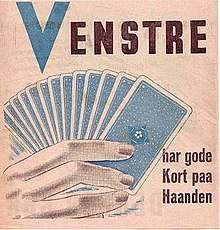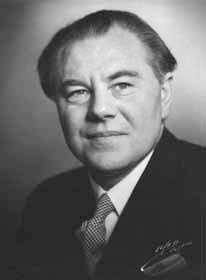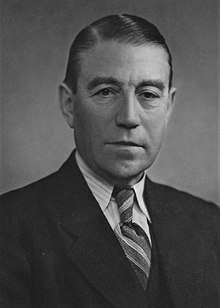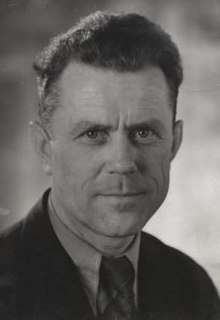1945 Danish Folketing election
Folketing elections were held alongside Landsting elections in Denmark on 30 October 1945,[1] except in the Faroe Islands where they were held on 20 November. The Social Democratic Party remained the largest in the Folketing, with 48 of the 149 seats. Voter turnout was 86.3% in Denmark proper and 57.3% in the Faroes.[2]
| |||||||||||||||||||||||||||||||||||||||||||||||||||||||||||||||||||||||||||||||||||||||||||||||||
All 149 seats to the Folketing 75 seats were needed for a majority | |||||||||||||||||||||||||||||||||||||||||||||||||||||||||||||||||||||||||||||||||||||||||||||||||
|---|---|---|---|---|---|---|---|---|---|---|---|---|---|---|---|---|---|---|---|---|---|---|---|---|---|---|---|---|---|---|---|---|---|---|---|---|---|---|---|---|---|---|---|---|---|---|---|---|---|---|---|---|---|---|---|---|---|---|---|---|---|---|---|---|---|---|---|---|---|---|---|---|---|---|---|---|---|---|---|---|---|---|---|---|---|---|---|---|---|---|---|---|---|---|---|---|---|
| |||||||||||||||||||||||||||||||||||||||||||||||||||||||||||||||||||||||||||||||||||||||||||||||||
| |||||||||||||||||||||||||||||||||||||||||||||||||||||||||||||||||||||||||||||||||||||||||||||||||

Venstre 1945 election material ("Venstre has good cards to hand")
Results
Denmark
| Party | Votes | % | Seats | +/– |
|---|---|---|---|---|
| Social Democratic Party | 671,755 | 32.8 | 48 | –18 |
| Venstre | 479,158 | 23.4 | 38 | +10 |
| Conservative People's Party | 373,688 | 18.2 | 26 | –5 |
| Communist Party of Denmark | 255,236 | 12.5 | 18 | New |
| Danish Social Liberal Party | 167,073 | 8.1 | 11 | –2 |
| Danish Unity | 63,760 | 3.1 | 4 | +1 |
| Justice Party of Denmark | 38,459 | 1.9 | 3 | +1 |
| Independents | 55 | 0.0 | 0 | 0 |
| Invalid/blank votes | 6,131 | – | – | – |
| Total | 2,055,315 | 100 | 148 | 0 |
| Source: Nohlen & Stöver | ||||
Faroe Islands
| Party | Votes | % | Seats | +/– |
|---|---|---|---|---|
| Independent (People's Party) | 3,990 | 46.2 | 1 | 0 |
| Social Democratic Party-Self-Government Party | 2,521 | 29.2 | 0 | 0 |
| Independent (Union Party) | 2,127 | 24.6 | 0 | 0 |
| Invalid/blank votes | 12 | – | – | – |
| Total | 8,650 | 100 | 1 | 0 |
| Source: Nohlen & Stöver | ||||
gollark: There are probably some annoying legal things related to this.
gollark: There's no theoretical reason they couldn't contain an entire SDR nowadays.
gollark: It could. Too niche for most people to use it I assume.
gollark: I've learned to live with incredibly bad images.
gollark: And aren't bad.
References
- Dieter Nohlen & Philip Stöver (2010) Elections in Europe: A data handbook, p524 ISBN 978-3-8329-5609-7
- Nohlen & Stöver, p540
This article is issued from Wikipedia. The text is licensed under Creative Commons - Attribution - Sharealike. Additional terms may apply for the media files.


